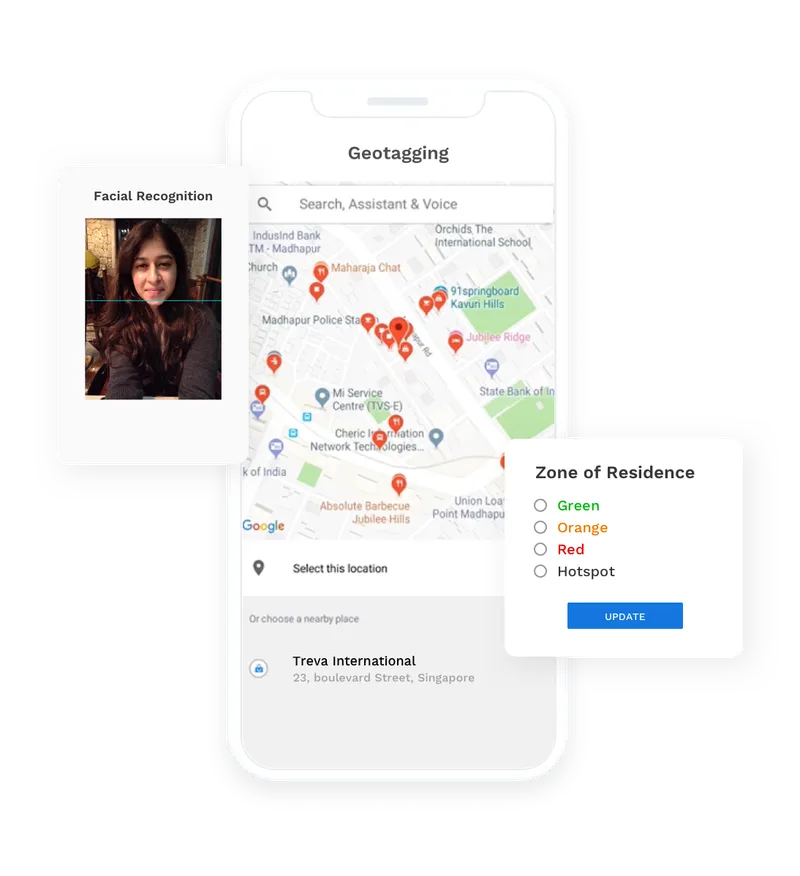1550723198939.jpg)
Amazon Web Services
View Brand PublisherPowered by AWS, here’s how startups are enabling businesses to transition to the “new normal” at the workplace.
Even as efforts are underway to reopen offices and businesses, and encourage employees to return to work, there is little clarity about the future of the workplace. Because of the nature of their work, many industries continued to work through the pandemic with a smaller employee count on the premises, while many transitioned into a remote working model. While many are considering a hybrid model, business operations will continue to be digitally-enabled and driven.
We spoke to three startups, IOanyT Innovations, and , that are helping organisations look after their employees’ safety, both at the workplace and online, transition to a digital working environment, while also ensuring that employees stay motivated and productive.
Read how these startups powered by AWS technologies are enabling businesses to adapt to the new world order.
IOanyT Innovations
As employees make their way back to offices, the traditional RFID card or the biometric attendance management system is no longer favoured, since it involves physical interaction at a close range. Now, in addition to monitoring attendance, there is a need to monitor employees’ body temperature and ensure that they are following safety protocols like wearing masks or gloves. While these are mostly monitored manually, there is a chance for human error if the efforts have to be scaled up.
To address these challenges, IOanyT Innovations has designed a product called FaceIT, a contactless face recognition system with temperature and mask detection features. The device can mark employee attendance, verify their identity through facial recognition and capture their temperature and mask status, when granting entry permission. It can also capture details of visitors to enable monitoring at workspaces or public spaces like hotels and stores. It is a cloud-based solution compatible with wi-fi networks and can be integrated to a third party centralised attendance management system using APIs. The live feed from the device camera can also be monitored. All of this makes it highly relevant for all kinds of organisations.

“Today, there isn’t a robust solution in the market that comes with all the three key features and that’s what makes FaceIT ideal for businesses looking to bring human activity back into its workplaces,” says Nitin Goel, Founder & CEO, IOanyT Innovations. “We can also disable one or more features depending on the requirement, thereby ensuring that the product stays relevant for use cases even beyond the pandemic,” he adds.
FaceIT leverages a number of AWS solutions - from Amazon DynamoDB to cater to different requirements of the client’s data storage, to Amazon API Gateway to AWS Lambda to enable serverless data processing. At its core, FaceIT is powered by AWS IoT Core, and leverages a number of AWS IoT services like AWS IoT Device Shadow service, AWS IoT rule actions, among others.
Nitin says, “In addition to making it easy for a startup to build a robust Internet of Things (IoT) solution, AWS IoT gives it a lot of flexibility and scalability. With AWS IoT service, we are able to add and operate multiple FaceIT installations seamlessly.” He adds, “It would be extremely challenging if a startup had to put all its resources to develop a simple yet robust facial recognition solution. AWS IoT eliminates these challenges and helps us to speed up the product development timeline drastically.”
Darwinbox
Given that Human Capital Management (HCM) platforms have become critical for organisations to meet pressing concerns around employee safety, productivity, and compliance, Darwinbox, an end-to-end enterprise HR software startup, has designed Evol>e.
Evol>e is a lean suite of HR technology solutions designed to meet every organisation’s pressing concerns, from employee safety to remote work productivity, engagement, and compliance with new regulations, all through a single seamless solution. Since businesses today are compelled to be more frugal than before, Evol>e helps organisations avoid the need to deploy an entire platform and invest only in features critical to their operations at the moment.
“While there is a need for some organisations to focus on employee productivity, others need to ensure that the workplace is safe for employees to return to work. Many others are seeing the need to hire rapidly and digitally. And, Evol>e has been designed to meet the HR needs across the spectrum.”
Since its launch in June this year, today over 350 businesses across sectors and sizes are using Evol>e. Chaitanya Peddi, CoFounder and Product Head, Darwinbox, says, “While Evol>e addresses the current challenges, it also provides the perfect cushion for businesses to make a permanent shift to digital solutions.”
A number of AWS services have been key success drivers for Evol>e. “Darwinbox has used Amazon Rekognition to enable facial recognition. It uses proven, highly scalable, deep learning technology, and also provides accurate facial analysis and facial search capabilities that can be used in user verification and other user cases. This, coupled with geo-tagging, helps an organisation’s employees to log their check-in and check-out time, and also define their work location, thereby enabling a truly contactless employee attendance monitoring experience,” explains Chaitanya. Darwinbox also leverages Amazon Transcribe to capture voice as part of peer reviews and appraisal discussions in the performance management process, to create interview feedback notes, etc. and convert these to text files and record them internally.

Deploying these new services was made seamless using Amazon Elastic Kubernetes Service (Amazon EKS). “By using Amazon EKS and Amazon Elastic Compute Cloud (Amazon EC2) Spot instances, we were quickly able to deploy a lightning-fast micro-service architecture where the new containerised applications are built and deployed in a highly decoupled manner. Deploying workloads running them on Spot Instances helped with cost optimisation,” says Chaitanya.
Druva
With remote working becoming the new normal, there has been a rush to expand collaboration tools to achieve and maintain employee productivity. “Shifting online has increased the risk of exposing business-critical data to internal and external threats and safeguarding data on employee endpoint devices has become more important,” says Stephen Manley, Chief Technologist, Druva Inc.
Druva provides end-user data and SaaS application protection, preventing data loss, minimising data theft, and meeting compliance requirements.
Druva is designed as a cost-effective cloud solution which can be accessed from anywhere, and is well suited for post-COVID 19 workplace environments. “With our SaaS-based solution on AWS, Druva has been able to maintain its cloud backup SLAs without interruption,” says Stephen. He explains that Druva automatically stores backups in an offsite, secure AWS account. So in the event of an attack that corrupts, deletes, or modifies data, or locks out businesses from their data, recovery is easy. Druva provides a comprehensive disaster recovery solution which could prove to be useful in the event of catastrophic cyber-attacks and natural disasters.
“Since we are the last line of defense for our customers, our cloud operations, IT, security, and customer success team all have robust continuity plans to ensure that we support our customers without incident,” says Stephen. He explains, “Storing all data on the secured Amazon Simple Storage System (Amazon S3) has guaranteed 99.99999% data durability achieved through Amazon's built-in redundancy across up to three availability zones. In addition, it automatically moves data onto Amazon S3 Glacier Deep Archive for cost-effective long-term retention of data. With AWS data centers around the world, customers can protect their data in their required region. Another significant advantage is the cost factor. “We have a consumption-based license model based on the amount of Amazon S3 storage consumed, which translates into savings,” he says.
According to Stephen, AWS and Druva strengthen business resilience by protecting an organisation’s data in its safest place: the cloud. “AWS delivers scale, durability, and compelling cloud economics which allow you to instantly react to changing business requirements. Built on top of AWS, Druva eliminates any hardware, software, or maintenance costs related to cloud data protection. And, with the increase in cyber attacks and security challenges, Druva is well suited for post-COVID 19 workplace environments.”








